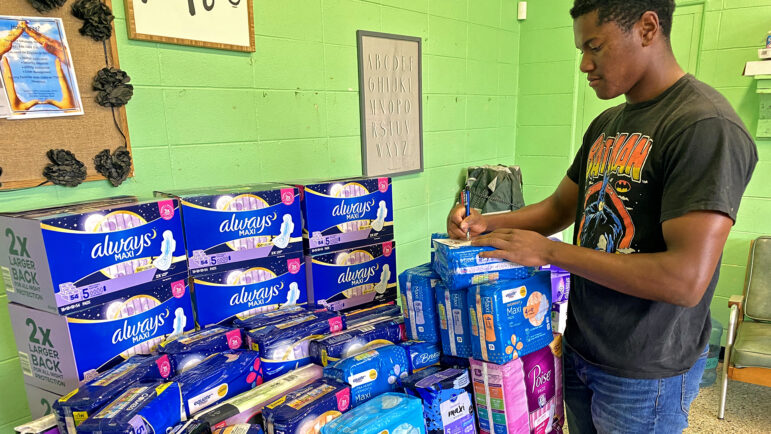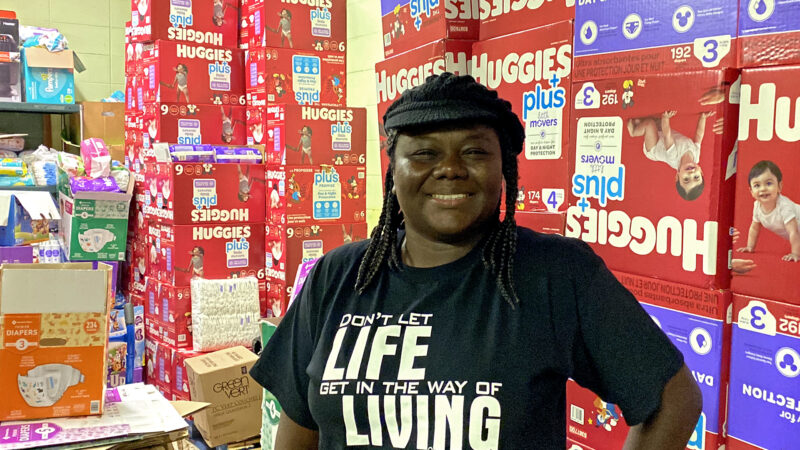With pandemic-era boost to SNAP over, a Mississippi diaper bank is receiving more calls for help
Chelesa Presley stands in front of boxes of diapers that were donated to Diaper Bank of the Delta. Presley, the director of the nonprofit, said the team can package thousands of diapers a day.
The COVID-19 public health emergency ended in mid-May, putting a halt to pandemic relief funding across the United States. Now, the consequences of that decision are reaching some families who rely on social safety net programs, like the Supplemental Nutrition Assistance Program (SNAP) — which received a temporary boost during the pandemic. The recent drop in benefits has been felt hardest by those caring for children.
Chelesa Presley, co-founder of Diaper Bank of the Delta in Clarksdale, Mississippi, has a front-row seat to the aftermath.
“One of the things I have noticed over the past month, now that the pandemic has stopped, more families are calling me about hunger (and) food insecurity,” Presley said. “I get about three calls a day of families looking for food.”
Presley said some have also called for milk, while others need help with utilities or rent.
The diaper bank has served as a community hub for parents and caregivers since it opened in 2015. That year, Presley said it distributed 10,000 diapers. Fast forward to 2022, and that number has skyrocketed to 770,000.
But the nonprofit has expanded its scope exponentially since its inception — sifting through daily donations of car seats, baby beds and menstrual products, but also working to connect families to resources and provide them with the tools to raise a child.
Part of that includes helping new parents apply for SNAP benefits, and while Diaper Bank of the Delta tries to connect them to those resources, Presley said it’s hard for families to survive when funds are cut — even outside of the emergency relief.
Diaper Bank of the Delta has more than 20 community partners across Mississippi and into West Arkansas. Those partners get supplies into their local towns, and Presley often mails packages directly to doorsteps — at no cost to parents.
The Diaper Bank of the Delta hopes to ease some of the financial burden of raising a baby in rural Mississippi for parents, like Takieria Holmes.
Holmes is a mother of two, and she said raising her children in Clarksdale has been tough.
“It’s challenging now, trying to make sure the two children that I have already is good and have everything that they need, and making sure that I’m good and have everything that I need, and trying to make sure that, you know, we have a roof over our head and food to eat,” Holmes said.
Holmes previously received SNAP benefits with her two children, and now that she’s 31 weeks pregnant with her third, she’s thinking about signing up again.

Many residents in Clarksdale qualify for supplemental income or Medicaid, but Presley said the guidelines to receive benefits can be too stringent. It’s a narrow line to straddle, and something as simple as a new job or a raise of a few dollars can knock struggling families into the next bracket — leaving them in poverty, only slightly less so.
“Why do we as a society expect that people who are on public assistance just to all of a sudden get a job one day, and now you’re off of all these benefits?” Presley said. “That’s hard.”
This story was produced by the Gulf States Newsroom, a collaboration between Mississippi Public Broadcasting, WBHM in Alabama, WWNO and WRKF in Louisiana and NPR. Support for reproductive health coverage comes from The Commonwealth Fund.
40 years after ‘Purple Rain,’ Prince’s band remembers how the movie came together
Before social media, the film Purple Rain gave audiences a peak into Prince’s musical life. Band members say the true genesis of the title song was much less combative than the version presented in the film.
Park Fire in California could continue growing exponentially, Cal Fire officer says
Cal Fire has confirmed that over a hundred structures have been damaged in the Park Fire, which grew overnight near Chico, Calif. Difficult firefighting conditions are forecast through Friday night.
Checking in with Black voters in Georgia about the election, now that Biden is out
Some voters who could be key to deciding who wins Georgia. What do they think about Vice President Harris becoming the frontrunner in the race to be the Democratic nominee?
Tahiti’s waves are a matter of ‘life and death’ for surfing Olympics
Tahiti's Teahupo'o wave has a slew of riders for the Paris 2024 Olympics. NPR finds out why it's called one of the most dangerous waves.
Researchers are revising botanical names to address troubling connotations
Since the mid-1700s, researchers have classified life with scientific names. But some of them have problematic histories and connotations. The botanical community is trying to tackle this issue.
A spectacular opening ceremony wowed a global audience despite Paris’ on-and-off rain
The Paris Olympics opening ceremony wowed Parisians, fans and most everyone who was able to catch a glimpse of thousands of athletes floating down the Seine to officially begin the Games.



